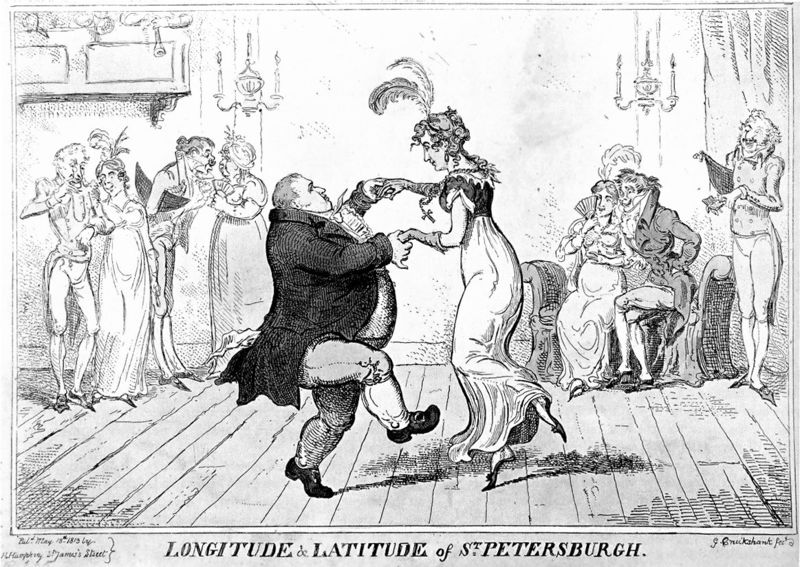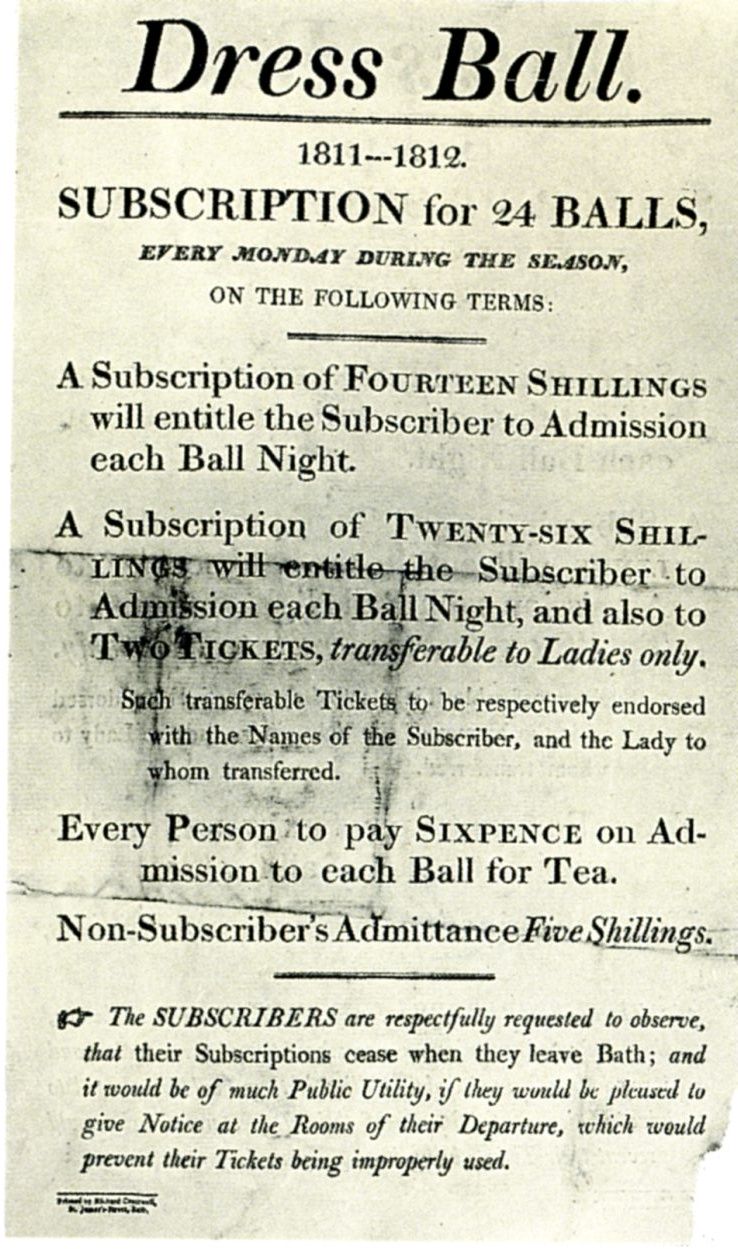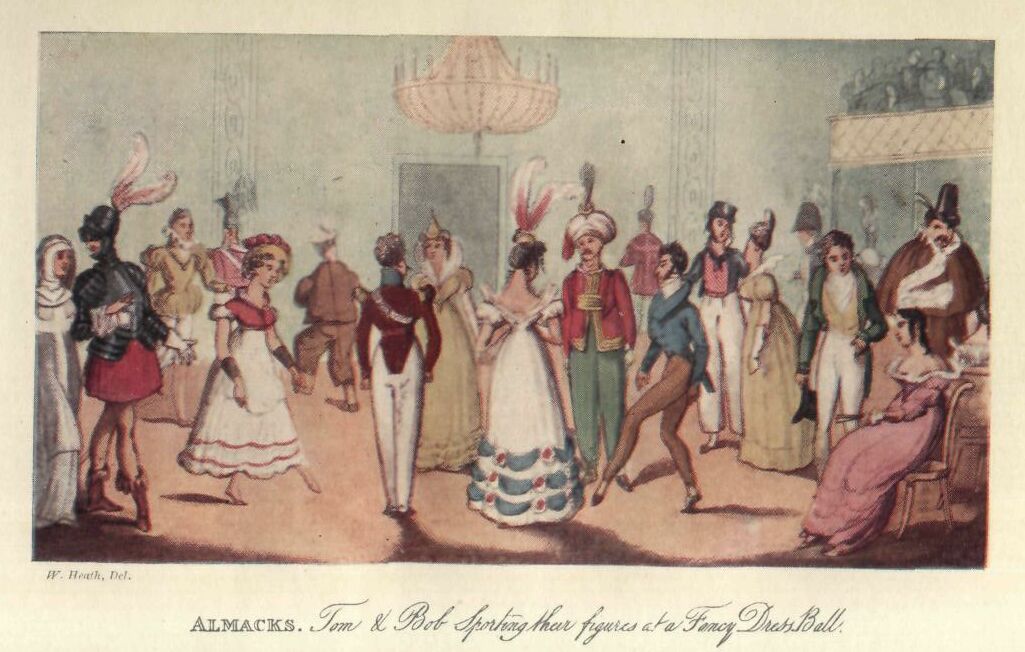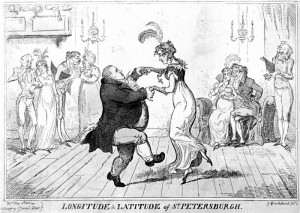
“Longitude and Latitude of St. Petersburg” by George Cruikshank, May 1813. Caricature of Almack’s patroness Countess Lieven waltzing at an assembly at Almack’s. From Wikipedia Commons.
Balls, routs, mornings that started at 11 and ended at 4, and a requirement to be seen—no, recognized—no, ADMIRED through every waking minute of it. Daunting but exciting at once for a young woman coming into society. (Note that “debutante” would not be used in this context until 1817.) The trouble for Regency writers is not in imagining the lovely scenes with beautiful gowns and handsome men; the magic of TV and movies helps with that. The trouble is, when exactly did the Regency Season begin and end? “Experts” cannot agree. I would argue that it wasn’t like a statutory holiday, rather a living thing that depended more upon those who made it what it was.
The part of the experts’ time lines that makes sense is that the Season coincided with the sitting of Parliament. Peers who took their seats in the House of Lords and gentlemen members of the House of Commons would head up to Town (London was always up, no matter what direction one was headed), and their families would follow. With a critical mass of the rich and famous in Town, it became party central. The action gained momentum as the months passed, until Parliament adjourned, and all and sundry relocated to country houses or resort towns. Of course, Parliament would break for Christmas, Easter, and sport (hunting) seasons.
With that knowledge as their basis, various sources state definitively that the London Season took place from January to June, February to June, January to April, January to May, March to June, and January or February to August 12, when the grouse hunting season began. They claim the “Little Season” took place from September-November, October-November, or that there is no evidence it existed, and it was invented by Georgette Heyer! I won’t embarrass any of them with references. But all set a specific set of dates for something that was likely more fluid.
So rather than just assume that Parliament took place between certain dates all the time, why didn’t anyone check Hansard? For those unfamiliar, Hansard is the record of Parliament. It comes from the name of Thomas Curson Hansard, one of the original publishers of the summaries of Parliamentary debates. We use the same word in Canadian Parliament.
The dates Parliament sat from 1810 to 1813, when most Austen-inspired fiction takes place are:
- 1810: January 23 to June 21, with an Easter break from April 17-23.
Members were called to discuss the King’s Illness on various dates from November 1, 1810 to January 8, 1811, however, it was not a regular session of Parliament. This is often referred to as the “Year of No Christmas.” - 1811: January 11 to July 24; break April 10-26. The “Regency bill” was passed on February 5, 1811.
- 1812: January 7 to June 30; break March 29 to April 8. Prime Minister Perceval was assassinated on May 11, 1812.
- 1812-3: November 24, 1812 to July 22, 1813; breaks from December 18 to February 3 and April 12 to May 12.
The sitting of Parliament appears varied during these few years, as seems reasonable. If any “Little Season” took place, it would be in 1810 and 1812. However, 1810 consisted of emergency meetings, and it was unlikely the duration could be planned. The date set for Parliament to reconvene in 1811 had probably been set at adjournment the previous session, so I don’t think many MPs (Members of Parliament) would have moved their families earlier than then. In 1812, we have November 24-December 18 as possible party time, but that’s a short time to develop any sort of a season.
The suggestion that the unofficial height of the Season occurred after Easter makes sense as well. Weather would be better for traipsing around in diaphanous gowns. The Almack’s patronesses began meeting on Mondays in March and handing out their very exclusive vouchers in April, with a dinner and ball held every second Wednesday. The boxes at the opera became more widely available, and it was unfashionable to attend the opera until that took place. In June, the annual Exhibition at the Royal Academy opens and the Royal Ascot takes place at this time, even to this day.
It also makes sense for the London Season to end as the weather warmed. The city was already full of odours of horse and human waste, coal smoke, and damp (mold) in the winter, but added to the heat of summer, it would be stifling. A “Summer Season” of balls took place in the resort towns such as Bath and Ramsgate. Bird hunting took place in the late summer, and fox hunting in the fall, so gentlemen would prefer to be in the country during those seasons.
The London Season was expensive: a gent could be relieved of his blunt by a daughter faster than by a thief from Seven Dials. One was required to maintain a carriage, horses, stables, and the full running of a second household; purchase unique fashionable costumes and accoutrements for all sorts of activities, as well as event tickets, including season tickets for balls; and entertain. Activities included dinner parties, balls, routs, fancy balls, breakfasts, card parties, concerts, court parties, shopping, theatre, opera, pantomime, soirees, and musicales. Sporting events like horse racing could empty one’s pockets, too. Traffic jams were common, and one could spend as much time in the carriage waiting in queue to be attended as dancing at the ball.
The events of the Season were essential for the aristocracy, landed gentry, and higher-ranked urban tradesmen and professionals to attend with their families. The number of potential matches on hand was unequalled at any other time, and allowed prioritization to achieve the best possible matches with their sons and daughters. But the reverse also took place, and the prestige offered by attendance at the right events affected choice of mate just as much. The denizens of the drawing rooms would scrutinize each other at length, and one’s social standing could be won or lost as quickly as a patroness put a name to a voucher.
It’s no wonder we’re fascinated with “Party Central,” as we imagine all the different scenarios of social interaction and intrigue that can be played out. Oh, to be a fly on the wall!
~
Previously posted in the former online newsletter Peculiar Ramblings.




